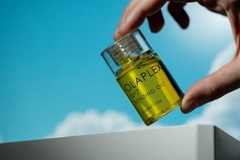Beiersdorf, Evonik and WWF unite for deforestation-free palm oil by protecting Borneo forests and farmers
25 Jan 2023 --- As the EU tightens its deforestation rules, Beiersdorf and World Wildlife Fund For Nature (WWF) strengthen their partnership by aiding the conservation of natural forests on the island of Borneo until 2026. Evonik, Beiersdorf’s supplier of palm (kernel) oil derivates, is to join the project, which promotes the cultivation of palm oil sourced from sustainable supply chains, thereby helping farmers.
“In line with the new EU deforestation rules, this project aims to support smallholder farmers in obtaining RSPO certification (Roundtable on Sustainable Palm Oil). RSPO agricultural practices strengthen the integrity of the forest ecosystems and contribute to halting deforestation,” a spokesperson at Beiersdorf tells PersonalCareInsights.
“Beiersdorf sees this project as an opportunity to support the sustainable production of palm oil by empowering smallholders while at the same time contributing to the common goal of deforestation-free palm oil supply chains.”
The EU Council and the European Parliament struck a provisional deal last month to minimize the risk of deforestation and forest degradation caused by the expansion of agricultural land to produce imported or exported commodities.
The bodies agreed upon rules requiring operators to trace their products to the land where it was grown. Those sourcing from lands with a high risk of deforestation will face increased checks and possible fines.
Palm kernel oil for personal care applications
We delve into the three-pronged collaboration to bring transparency to the efforts toward sustainably-sourced personal care where palm oil derivatives are popularly used in cosmetics.  Beiersdorf reports experiencing no real impacts despite the broader political scenario between the EU, Malaysia and Indonesia.
Beiersdorf reports experiencing no real impacts despite the broader political scenario between the EU, Malaysia and Indonesia.
“Many ingredients essential for the production of cosmetic products – such as emulsifiers and surfactants – are extracted from mineral or vegetable oils, e.g., palm (kernel) oil,” the spokesperson for Beiersdorf explains to PersonalCareInsights
“As a global skincare company, we do not purchase palm (kernel) oil directly but use derivatives (further processed substances based on palm (kernel) oil). To conserve scarce resources and minimize the environmental impact of our products, we work closely with our partners along the supply chain to promote a sustainable palm oil economy.”
Beiersdorf reports that it uses approximately 30,000 metric tons of palm (kernel) oil derivatives annually to manufacture its skin and body care products, including the Nivea and Eucerin brands. It also uses the ingredient to produce “sustainable lubricant additives.”
Forest heart of Southeast Asia
The spokesperson explains that the project area is part of the Heart of Borneo (HoB). Beiersdorf and WWF have been working with the smallholders in the Kapuas Hulu District, Indonesia, since 2018, which led to the formation of the smallholders’ association “Mitra Bersama.”
“HoB is a global priority landscape with the largest remaining expanse of transboundary tropical forest in Southeast Asia, covering more than 22 million hectares (ha) of tropical rainforest across Brunei, Indonesia and Malaysia,” explains the spokesperson.
“In the project area, WWF Indonesia’s engagement strategy is based on a landscape approach and aims at implementing a Green Economy concept to ensure the protection of remaining forest within the landscape.”
Borneo is known for being the third largest island in the world and is home to one of the most critical rainforests with significant biodiversity.
Joint partners
“Mitra Bersama,” which translates to joint partner, consists of around 200 members who together own about 300 hectares of the land and are to be certified according to the RSPO standard.
“The smallholder project in Indonesia is part of a partnership between WWF Germany and the two companies Beiersdorf and Evonik. Both companies support WWF Germany and WWF Indonesia to implement the smallholder project in West Kalimantan, Indonesia,” shares the spokesperson.  Palm (kernel) oil are used for emulsifiers and surfactants (Image credit: Beiersdorf).
Palm (kernel) oil are used for emulsifiers and surfactants (Image credit: Beiersdorf).
“Evonik joined the project’s second phase and is involved as one of the main suppliers of Beiersdorf for palm (kernel) oil derivates and as a link to a responsible supply chain in the future.”
They share that the collaboration, on a social level, aims to improve the local communities living standards and income situation.
“Through the commitment, not only are the 240 smallholders involved in the project supported directly, but also all inhabitants of the three local villages indirectly.”
How can palm oil be sustainable?
Since the end of 2020, Beiersdorf only uses palm (kernel) oil from sustainably RSPO-certified sources in all its products worldwide, says the spokesperson.
“When sustainably cultivated, oil palms are ecologically very efficient plants that allow maximum oil production on a comparatively small area of cultivated land. At Beiersdorf, we actively support a sustainable palm (kernel) oil economy that does not lead to the deforestation of rainforests, i.e., primary or secondary forests,” they continue.
At Evonik, Yann d’Hervé, head of the Care Solutions business line, says that sustainability is its main business driver.
 “RSPO agricultural practices strengthen the integrity of the forest ecosystems and contribute to halting deforestation,” says the spokesperson.“The origin of our raw materials is of great importance to us. A large proportion of our cosmetic and cleaning solutions are already based on renewable raw materials,” he says.
“RSPO agricultural practices strengthen the integrity of the forest ecosystems and contribute to halting deforestation,” says the spokesperson.“The origin of our raw materials is of great importance to us. A large proportion of our cosmetic and cleaning solutions are already based on renewable raw materials,” he says.
The collaboration is an attempt to transform corporate objectives with local nature conservation, says Silke Düwel-Rieth, head of business and markets at WWF Germany. “Together, we are strengthening sustainable palm oil production to preserve healthy, species-rich forest systems.”
The political landscape of Malaysia and Indonesia
Earlier this month, Indonesia and Malaysia joined forces against the EU Deforestation rules. The two world leaders of palm oil production said that the EU directive would reduce reliance on their palm oil production by only allowing its import into EU markets if it was obtained without a link to deforestation.
Beiersdorf reports experiencing no real impacts despite the broader political scenario.
“Beiersdorf is convinced that sustainable RSPO-certified palm oil is a good solution and does not plan to phase out palm (kernel) oil derivatives from its formulations,” the spokesperson tells us.
“As a global company, Beiersdorf sources so-called palm oil derivatives on the world market to manufacture its products, which come from various countries in Asia, Europe and Latin America. So far, we have faced no major negative impact from the situation in Indonesia and Malaysia.”
By Venya Patel














